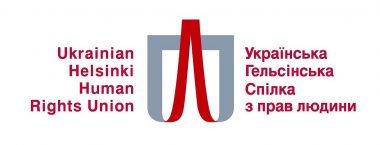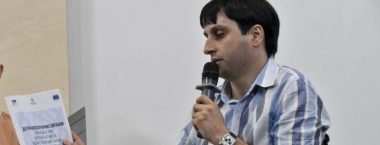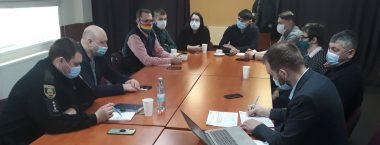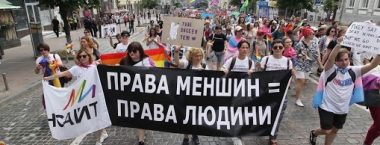
Statement on persecutions in Belarus
Scheduled presidential election in the Republic of Belarus on 9 August 2020 resulted in a...
16 April 2021
In March 2019, UHHRU Executive Director Oleksandr Pavlichenko together with Dmytro Reva and Maryna Davydova were on a monitoring visit to Sofievka penitentiary establishment No 45. For the moment of the visit there were over 50 convicted persons with HIV-AIDS.
State institution Sofievka penitentiary establishment No 45 (SPE-45) is the institution with average security level for men imprisoned for a certain term, which are recognized as disabled of first or second group requiring constant medical supervision and rehabilitation. At the territory of the establishment there is also the healthcare facility, where 57 persons stay at the moment.
The penitentiary establishment gradually carries out repairs of living space where convicts stay, at that the recommendations to move from barrack system to bunk room system are taken into account.
The most seriously ill convicts stay in 12th detachment. There are people which as a rule require individual care. Thus, at the time of the visit one of the convicts was in the condition after stroke, other convicts were forcedly helping him, feeding and changing pampers. As he could not manage himself. To our opinion such persons cannot and shall not stay in the penitentiary establishments, even with rather mild regime of imprisonment, which exists in SPE-45. Convicts of the 12th detachment can stay in beds during the day, which corresponds their health status, but the conditions of stay are poor, there is unpleasant smell in the rooms, at the beds of many ill people the bed clothing is untidy and dirty.
One of the problems mentioned by convicts and confirmed by the representatives of the administration was absence of disability status for the convicts, which evidently had all grounds for receiving disability group. Convict B. proved that when he had been arrested all documents had been taken away, passport, PIN, and without these documents he could not get disability status, and correspondingly relevant treatment. He has heart disease requiring change of two valves, it is not realistic to do such operation in the conditions of the hospital, there are no required drugs for him in the penitentiary establishment, according to him. As the convict stressed, in order to be released on parole one should have positive characteristic mentioning active participation of the convict in the life of the penitentiary establishment. Instead ill people often don’t have physical capacity to get involved in amateur activity or other social activity, thus this indicator, when considering the conditions of release on parole shall not be decisive for convicts with illnesses not allowing them to get involved in such activities.
Convict K. out of prison had second disability group for life, already in the hospital he undergone serious operation on the head, but has no opportunity to use his status of a person with disability, in the result of which he does not receive disability payments or other possible benefits.
It was specifically stressed, that in penitentiary establishment the convicts according to the documents were recognized to be people with disabilities, but the status was not confirmed accordingly with the documents of the medical commissions and social protection institutions outside the penitentiary system. Correspondingly, this is the issue of possibility to receive pension, other benefits. The documents are issued at the own expense of the convicts, which is not affordable for everybody, as they do not work in the penitentiary establishment and do not receive money, and outside the penitentiary establishment not all of them receive support.
From other convict the monitors received the complaint on poor healthcare services, which made impossible the treatment of advanced diseases, in the result of which he lost lower limbs. But the head of the medical unit did not agree with worsening of the condition of the patient and characterized his condition as stable. To the complaints of other convict on the absence in the medical unit of the medicines for treatment of gastrointestinal diseases, the doctor and administration assured that they had necessary medicines, and the convict was constantly complaining to different institutions, which was a form of protest for him.
During the discussion with the head of the medical unit it was established that for the last year not a single person had been released from this penitentiary establishment because of health condition (in line with Article 84 of CCU), for that period only for one person – Zgurskyi – the documents were submitted for release, but he died had not received the court ruling.
At the same time for the year 8 persons died in the penitentiary establishment, 6 with diagnosis of acute heart failure, two persons because of HIV/AIDS. There is a lack of qualified doctors and support staff in the medical unit. Thus, there is physician and specialist in communicable diseases, there are no radiologist, TB specialist, lab assistant in the X-ray lab, neuropathologist, psychiatrist, therapist for substance abusers. Actually the hospital turned into the first aid ambulance station, where initial examination is carried out and first emergency aid is provided, for other healthcare services one has to go the nearest hospital in Sofievka or Dnipro (IOH).
There are 57 persons with HIV-AIDS in the penitentiary establishment, 42 of them receive ART, as a rule two component. The specialist in communicable diseases regularly comes from Kryvyi Rih for consultation, the convicted are regularly tested for CD-4 cells and viral load.
The administration of the penitentiary establishment mentioned one more problem, which was caused by the change in the subordination of the medical units in the penitentiary establishments. As the medical unit became the standalone division, so it should provide the care for the patients, cleaning, which was previously the responsibility of the maintenance division. There are neither funds, not staff for that, thus, by inertia, the penitentiary establishment provides its staff (convicts working in the maintenance team) for these works in the medical unit, though they should not do these works.
Main recommendations based on the results of the visit to SPE-45 are as follows:
The issue of release of ill people at the terminal stage, or those having the diseases not allowing them to stay in the penitentiary establishment and receive relevant treatment and care shall be reviewed. Not a single person has been released from the penitentiary establishment on the reasons on health condition and only one was submitted for release, instead 8 persons died during the year.
It shall be specially mentioned that ill persons and persons with disabilities cannot boast with their participation in amateur activities or other activities, which are among the requirements (with relevant incentives) for release on parole, persons in the arm chairs or bed patients do not have such possibility and it is not correct to apply this requirement to them.
Significant problem, requiring further review, is the issue of resocialization of persons released from the penitentiary establishments after serving the sentence, big number of convicts are asocial elements and they not always have the place where they can return. The vivid example is the cemetery in the penitentiary establishment. Nearly all who died there were buried there, at that it is a rear case that relatives put a cross on the grave or gravestone, as a rule there is a pole with the number on such graves (picture).
Ukrainian Helsinki Human Rights Union implements the project “Development of the legal network for protection of the people leaving with HIV/AIDS, representatives of key PLHIV communities and persons ill with TB” with the financial support of the Charitable organization “All-Ukrainian Network of the People Living with HIV/AIDS” in the framework of implementation of the project “Releasing the Burden of TB and HIV infection through creation of the open access to timely and quality diagnostics and treatment of the TB and its resistant forms, expanding evidence based prevention, diagnostic and treatment of HIV infection, and creation of stable and sustainable health protection systems”, which is implemented with the financial support of the Global Fund to Fight AIDS, TB and Malaria.
If you find an error on our site, please select the incorrect text and press ctrl-enter.

Scheduled presidential election in the Republic of Belarus on 9 August 2020 resulted in a...
16 April 2021

What is the difficulty with ensuring security during peaceful gatherings of the LGBTQ+ community? What...
24 February 2021

On February 19, 2021, an event entitled “Security during LGBTQ+ peaceful gatherings” took place in...
21 February 2021

Every summer LGBTIQ+ Pride events are held around the world and in Ukraine in memory...
20 June 2020